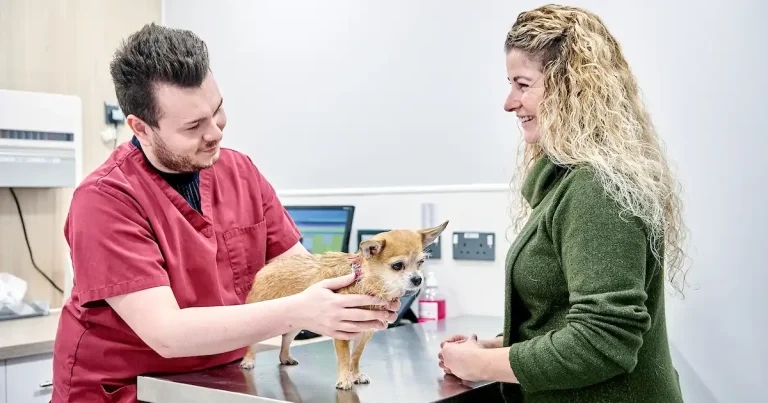10 Sept 2025
The Confidence in Consulting training initiative is said to help vets and vet nurses consult “authentically” rather than following a rigid checklist.

West Mount Vet consultation with student nurse Ryan Smith (left) and practice director Jaimie Richardson.
CVS is deploying a new training programme designed to improve veterinary professionals’ confidence and client communication during companion animal consultation.
The programme, Confidence in Consulting, has been created by GP Martin Brunet – a former programme director of GP training schemes – based on a model said to be successfully tested in human healthcare.
Dr Brunet’s “two houses” model focuses on a pair of key consult objectives, discovery and decision – in essence, working out what matters and deciding how to proceed along with the client.
It is said the model allows for vets and vet nurses to consult in their own style, with an emphasis that relationships, empathy and shared decision-making form the basis of effective consultation.
Dr Brunet will train “super” trainers in an intensive two-day course, who will in turn run a day course to train a designated coach in each of CVS’ companion animal practices.
The coaches will then roll out the training across their practice teams, beginning with vets with up to three years’ experience.
CVS’ VetGDP advisers will all be trained as coaches within the programme, which will also be delivered at the group’s new graduate residential weeks.
Each new graduate will be observed during – and given detailed feedback on – at least three consultations each month, and likewise they will be encouraged to develop their own “toolbox” and consultation style by observing other vets’ consults.
CVS’ director of learning and development Mark Moreton said consulting “should be a conversation based on connection, empathy and understanding”.
He added: “This new programme marks the start of a step change in CVS.
“It is the beginning of an ongoing focus on consulting and communications skills – not just in simple situations but in complex, challenging and emotionally-charged situations.
“We hope to transform the way care is delivered in our practices and how we are perceived by our clients.”